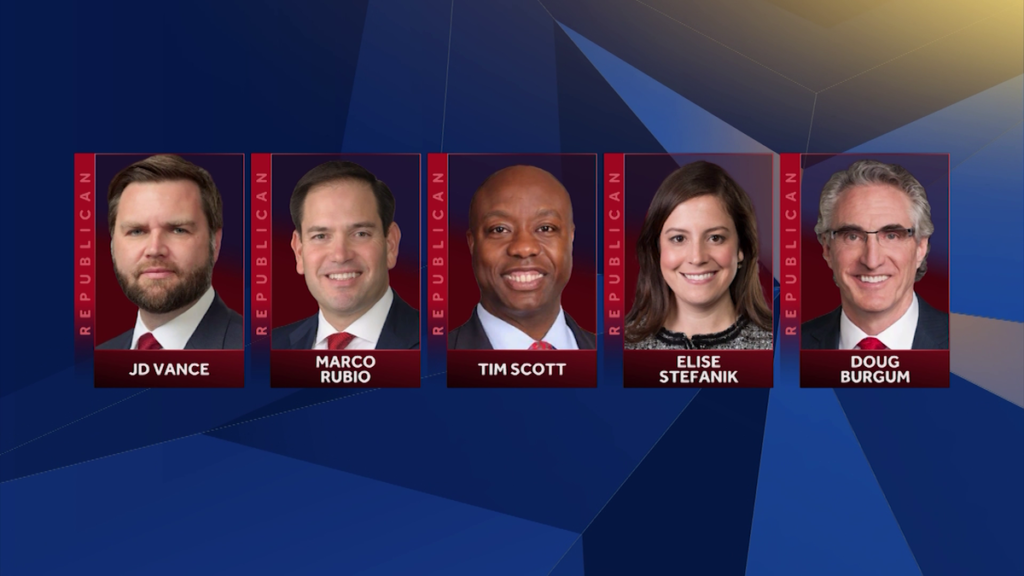With the Republican National Convention just a week away, it remains a mystery who former President Donald Trump's running mate will be. Former President Trump has said that the primary consideration for a running mate is someone who is qualified to succeed him. Other factors also influence the decision. Currently, it seems that only Trump himself knows the answer. Currently, the list of candidates includes five people: Senator J.D. Vance of Ohio, Senator Marco Rubio of Florida, Senator Tim Scott of South Carolina, Representative Elise Stefanik of New York, and Governor Doug Burgum of North Dakota. In an interview with CNN, Rubio said it is unclear where Trump stands on the matter. “I haven't heard anything, I don't know anything. You probably know better than I do,” Rubio said. “Donald Trump has a decision to make. He'll make it when he needs to. He'll make a good decision.” Vance expressed similar sentiments in another interview. “If I get a call, I'll let the media know,” Vance said. “But most importantly, we're trying to get Donald Trump elected. He has a lot of great people to choose from, whoever the vice president is.” For many of the candidates, people who were not once Trump supporters are now his biggest fans. “They may have had differences in their past lives, but now they're completely aligned with Donald Trump and couldn't be more supportive,” said Casey Bahgat, a political analyst at George Washington University. Experts say whoever Trump picks will have to meet several criteria, including fundraising ability, debate ability and little risk of outdoing or threatening Trump. “The most loyal person is probably going to win, because we know Donald Trump really values that among his candidates and his supporters,” Bahgat said. Another factor Trump may be considering is the person's ability to control a constituency he doesn't yet have. That was the case with Mike Pence, whom Trump nominated in 2016. Pence swayed the support of evangelical voters. But the decision may only have a small impact on Trump's campaign, as experts say voters are focused on whoever ends up at the top of the list — in this case, Trump or Biden — and the vice president could swing votes slightly depending on home state.
With the Republican National Convention just a week away, it remains a mystery who former President Donald Trump's running mate will be.
The former president has said his biggest concern in a vice presidential candidate is having the right person to succeed him, and there are other factors that play into the decision — and at this point, only Trump himself seems to know the answer.
There are currently five candidates on the shortlist: Sen. J.D. Vance of Ohio, Sen. Marco Rubio of Florida, Sen. Tim Scott of South Carolina, Rep. Elise Stefanik of New York and Governor Doug Burgum of North Dakota.
Rubio, in an interview with CNN, said it was unclear where Trump stood on the issue.
“I haven't heard anything, I don't know anything. You probably know more about this than I do,” Rubio said. “Donald Trump needs to make a decision. He'll make a decision when he needs to. He'll make a good decision.”
Vance expressed similar views in a separate interview.
“If we get a call, we'll let the media know,” Vance said, “but most importantly, we're working to get Donald Trump elected. Whoever becomes vice president, he has a lot of great people to choose from.”
For many of the candidates, people who were once non-Trump supporters are now his biggest fans.
“While they may have had their differences in a previous life, they are now completely aligned with Donald Trump and couldn't be more supportive,” said Casey Bahgat, a political analyst at George Washington University.
Whoever Trump chooses, experts say, will have to meet several criteria, including fundraising skills, debating ability and posing little risk of outdoing or threatening Trump.
“The most loyal person is probably going to win, because we know that Donald Trump really values that among his candidates and his supporters,” Bahgat said.
Another factor Trump may be considering is whether that person has the ability to control a segment of voters he doesn't already have, as was the case with Mike Pence, Trump's 2016 pick, who helped mobilize evangelical voters.
But the decision may have little impact on Trump's campaign, as experts say voters are ultimately focused on whoever is at the top of the list — in this case, Trump or Biden — and the vice president could sway a small margin of influence by skewing votes based on home state.

